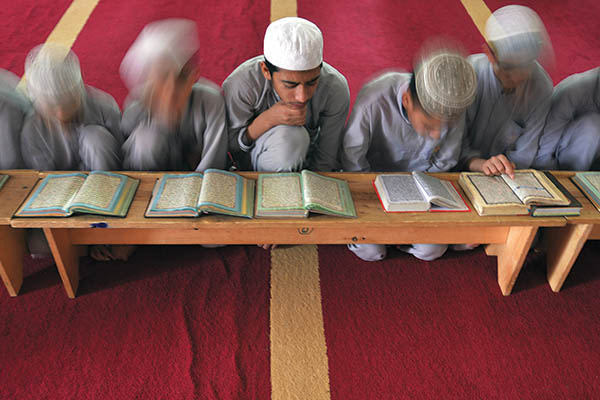
Aamir Qureshi—AFP
A new draft law is worthless if the government doesn’t have the muscle to enforce it.
A special assistant to the chief minister of Sindh has claimed the provincial government has prepared a draft law to regulate madrassas under its jurisdiction. To ward off Islamist criticism, he took special care to mention that he had had prior consultation “with the representatives of five boards of madrassas.”
When Sindh reported the number of madrassas in Karachi alone, the figure was challenged—and more than half of them were unregistered, which means the government doesn’t know what goes on there. Many are called “jamia,” which means “university” rather than school.
“Regulation” refers to determining who funds the seminaries and who enters their portals to learn what from whom. The last time these portals of Quranic learning was in 1990, when they issued fatwas declaring Shia Muslims apostate, which meant the minority could be killed to please Allah. Mufti Shamzai, who headed the Jamia Banuria madrassa, guided Mullah Omar and allowed anti-Shia and anti-Ismaili fatwas while being funded by Saudi Arabia. He was killed by a Shia in revenge. Two great killers of Punjab, Maulana Azam Tariq of Sipah-e-Sahaba and Maulana Masood Azhar of Jaish-e-Muhammad both graduated from Banuria. And Azhar actually linked up with Al Qaeda and is still unpunished.
What good is any regulatory law if you don’t have the muscle to enforce it? When then-president Pervez Musharraf took on the Islamabad-based Lal Masjid-aligned madrassa whose head was a graduate from Karachi’s Jamia Banuria, he fell from power and the country sided with the lawbreaking vigilante clerics. The latest note from the Afghan Taliban is about Maulana Salimullah Khan, one of the founders of Karachi’s Jamia Faruqia: “His recent death is an irreparable loss for the entire Muslim world and specifically for the followers of knowledge, Dawa [preaching] and Jihad.” After having wreaked havoc on Pakistan, Salimullah sent his two sons to live happily ever after in the United States from where they were soon deported. The Sindh government never had a clue.
